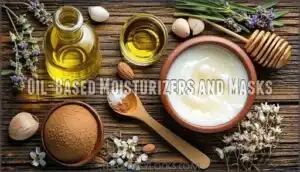This site is supported by our readers. We may earn a commission, at no cost to you, if you purchase through links.
 You can treat dry skin on your face naturally by using gentle, nourishing ingredients that work with your skin’s biology.
You can treat dry skin on your face naturally by using gentle, nourishing ingredients that work with your skin’s biology.
Honey acts as a natural humectant, drawing moisture into your skin, while oatmeal provides gentle exfoliation and anti-inflammatory benefits.
Coconut oil, aloe vera, and avocado deliver essential fatty acids and vitamins that restore your skin’s protective barrier.
Apply these remedies consistently, avoid harsh cleansers, and always moisturize damp skin to lock in hydration.
The secret lies in understanding which natural ingredients target your specific skin concerns and how to combine them effectively for maximum results to achieve healthy skin.
Table Of Contents
- Key Takeaways
- Causes of Dry Facial Skin
- Natural Remedies for Dry Skin on Face
- How to Rehydrate Dry Skin Overnight
- Tips for Preserving Skin’s Existing Moisture
- Adding Moisture to Dry Skin Daily
- Gentle Skin Care for Dry Facial Skin
- Choosing The Right Products for Dry Skin
- Protecting Your Skin From The Elements
- Home Remedies for Dry Skin on The Face
- When to Seek Medical Attention for Dry Skin
- Frequently Asked Questions (FAQs)
- How do I get rid of very dry skin on my face?
- How to treat dry skin around nails?
- How to get rid of dry skin on nose?
- Which home remedy is best for dry skin?
- How do I get rid of dry skin on my face asap?
- What can I put on my face for extremely dry skin?
- How can I rehydrate my dry face overnight?
- How does diet impact facial skin dryness?
- Can stress contribute to facial skin dryness?
- What role does sleep play in skin hydration?
- Conclusion
Key Takeaways
- You’ll get the best results by applying moisturizers to damp skin immediately after cleansing – this locks in moisture more effectively than waiting for your skin to dry completely.
- You can create powerful DIY treatments using kitchen ingredients like honey, oatmeal (provides gentle exfoliation), and aloe vera (delivers healing compounds) that work as well as expensive products.
- You’ll prevent further moisture loss by switching to lukewarm water instead of hot showers, using fragrance-free gentle cleansers, and protecting your skin from harsh environmental factors like dry air and extreme temperatures.
- You should seek medical attention if you experience severe cracking, bleeding, signs of infection, or persistent dryness that doesn’t improve despite consistent natural care – these symptoms may indicate underlying conditions requiring professional treatment.
Causes of Dry Facial Skin
Before you can treat dry facial skin naturally, you’ll need to understand what’s causing the problem in the first place.
Your skin loses moisture due to weather changes, harsh products, certain medications, and environmental factors like heating systems or chlorinated water, which are key factors to consider when addressing dry facial skin, particularly the impact of harsh products.
Weather Changes and Dry Air
During winter dryness and in arid climates, your skin loses moisture faster than it can replenish itself.
Cold air holds less humidity, while indoor heating systems strip away your skin’s natural oils. Air conditioning creates similar effects year-round.
Sun exposure accelerates moisture loss through UV damage.
Seasonal skincare adjustments help, but running a humidifier maintains ideal indoor humidity for natural skin hydration, which aids in preventing moisture loss and supports overall skin health through natural means.
Harsh Skin Care Products
Your skincare routine might be working against you.
Many products contain Irritating Ingredients that strip your skin’s protective barrier, leaving your face parched and uncomfortable.
- Drying Alcohols like denatured alcohol evaporate quickly, taking your skin’s moisture with them
- Sulfate Cleansers create that squeaky-clean feeling by removing natural oils your dry skin face desperately needs
- Synthetic Fragrances and Chemical Exfoliants can trigger inflammation, disrupting your natural skin hydration and worsening dryness
Skin Conditions and Medications
Beyond harsh products, underlying skin conditions can substantially impact facial moisture.
Eczema triggers inflammation that damages your skin’s protective barrier, while psoriasis treatment often requires specialized care due to increased water loss.
Rosacea dryness creates persistent irritation, and medication side-effects from acne treatments, blood pressure drugs, or antihistamines can worsen facial eczema relief needs.
Eczema, marked by sensitive, dry skin, is a hallmark symptom.
If you’re experiencing allergic reactions or persistent dry skin face issues despite natural skin hydration efforts, consult your healthcare provider about adjusting treatments while maintaining effective dry skin remedies.
Environmental Factors
Looking at your environment closely, you’ll notice several climate effects working against your skin’s natural balance.
Seasonal changes bring harsh winter winds that strip moisture, while indoor heating systems create desert-like conditions.
Pollution impact from urban environments clogs pores and accelerates water loss from your skin’s surface.
UV exposure breaks down protective barriers, leaving skin vulnerable to dehydration.
Poor air quality compounds these issues, making environmental factors the silent culprits behind persistent dry skin.
Understanding these triggers helps you choose effective natural remedies and maintain proper skin hydration through targeted natural skincare routines.
Natural Remedies for Dry Skin on Face
When your face feels tight and flaky, you don’t have to rely on expensive commercial products to restore comfort and hydration.
Natural remedies using ingredients from your kitchen can effectively moisturize, soothe, and repair dry facial skin while being gentler than harsh chemical alternatives, providing a solution that is both effective and gentler.
Oil-Based Moisturizers and Masks
Natural oils act like your skin’s personal bodyguard, creating an oil occlusion barrier that locks in moisture.
Carrier oils like jojoba mimic your skin’s natural sebum, while coconut oil’s fatty acids rebuild damaged barriers.
Create DIY recipes by mixing argan oil with honey for overnight masks.
These best natural oils provide natural face hydration more effectively than synthetic products.
Apply your homemade face moisturizer to damp skin for maximum absorption.
Essential oils should be diluted in carrier oils before use.
This natural skincare approach transforms parched skin into a supple, healthy complexion.
Coconut oil’s benefits include improved skin elasticity and suppleness.
Oatmeal-Based Remedies and Exfoliation
Oatmeal benefits dry skin through its natural anti-inflammatory compounds that soothe irritation.
For colloidal preparation, blend oats into fine powder and mix with warm water to create a gentle mask. This natural exfoliation method removes dead cells while protecting your skin barrier from further damage.
- Gentle scrub: Mix ground oats with honey for weekly face exfoliation
- Soothing mask: Combine colloidal oatmeal with milk for instant relief
- Bath treatment: Add oat powder to lukewarm water for full-body hydration
Honey and Aloe Vera Gel
Honey and aloe vera gel create nature’s most effective dry skin remedy.
Honey benefits include natural humectant properties that draw moisture from air while providing antibacterial protection.
Aloe properties feature 75 healing compounds including vitamins and amino acids.
For ideal gel application, mix equal parts raw honey with pure aloe vera gel, creating powerful remedy combinations.
This natural blend repairs damaged skin barriers while delivering intense skin hydration.
Always patch test before use, as individual sensitivities vary with natural skin care ingredients.
Fruit Enzyme Cleansers and Exfoliants
Frequently overlooked, fruit enzyme cleansers offer gentle exfoliation perfect for dry facial skin.
Papaya enzymes (papain) and pineapple enzymes (bromelain) naturally dissolve dead cells without harsh scrubbing. These natural powerhouses from strawberry and apple also provide enzyme benefits while maintaining your skin’s moisture barrier.
For enhanced results, consider vitamin C brightening serum to target hyperpigmentation.
Try DIY recipes combining mashed pineapple with honey for gentle exfoliation that leaves your face soft and renewed, using natural powerhouses and achieving gentle exfoliation.
How to Rehydrate Dry Skin Overnight
Looking at your request, I need to write a brief introduction for the "How to Rehydrate Dry Skin Overnight" subtopic following your specific guidelines. This is static content creation that doesn’t require web search or URL fetching.
Your skin works hard to repair itself while you sleep, making nighttime the perfect opportunity to combat facial dryness with targeted treatments.
You can wake up with noticeably softer, more hydrated skin by implementing a few strategic steps before bed that work with your body’s natural overnight renewal process.
Moisturizing Before Bed
Bedtime rituals transform your dry skin on face while you sleep. Apply moisturizing ingredients to damp skin for maximum product absorption, creating ideal conditions for overnight skin repair.
- Choose thick night creams with ceramides and hyaluronic acid
- Layer natural oils like jojoba or argan over moisturizer
- Apply overnight face mask weekly for intensive hydration
- Keep bedroom cool to enhance sleep quality and skin recovery
This natural skincare routine maximizes overnight hydration and skin repair.
Using a Humidifier
Transform dry bedroom air into your skin’s overnight spa.
Position a humidifier 3-4 feet from your bed, maintaining 30-50% ideal humidity for maximum skin hydration benefits.
Use filtered water quality to prevent mineral buildup, and follow maintenance tips like weekly cleaning to avoid bacteria growth.
Different humidifier types work well, but consistent use creates the perfect environment for natural skin care while you sleep.
Applying a Facial Mask
A hydrating face mask transforms your evening routine into intensive overnight therapy for dry skin on face.
Environmental factors can exacerbate dryness, making masks essential.
Mask Ingredients work best when combined strategically:
- Avocado-honey blend – mash half avocado with manuka honey for deep moisturization
- Oatmeal-oil mixture – combine colloidal oatmeal with jojoba oil for gentle exfoliation
- Banana-coconut treatment – blend mashed banana with coconut oil and turmeric powder
- Aloe-shea combination – mix fresh aloe vera gel with shea butter for soothing hydration
Apply using gentle upward strokes, avoiding the delicate eye area.
Mask Frequency should be 2-3 times weekly for ideal results without over-treating.
Drinking Plenty of Water
Water acts as your skin’s internal moisturizer, supporting cellular hydration and skin elasticity.
Drink 8-10 glasses daily for ideal hydration benefits, but don’t expect overnight miracles. Consistent water intake throughout the day maintains skin hydration naturally. Your body needs steady hydration, not last-minute flooding.
| Hydration Timeline | Skin Benefits |
|---|---|
| Morning (2-3 glasses) | Jumpstarts cellular hydration after overnight dehydration |
| Midday (3-4 glasses) | Maintains skin elasticity during peak activity hours |
| Afternoon (2-3 glasses) | Supports natural skin care processes and toxin removal |
| Evening (1-2 glasses) | Prepares skin for overnight repair without disrupting sleep |
| Signs of proper hydration | Plump skin texture, reduced fine lines, healthy glow |
Tips for Preserving Skin’s Existing Moisture
Once you’ve established a good skincare routine, protecting the moisture you already have becomes just as important as adding new hydration.
Simple changes in your daily habits can make the difference between skin that stays comfortable all day and skin that feels tight by noon, which highlights the importance of maintaining hydration.
Using Lukewarm Water
Hot showers feel great, but they’re sabotaging your dry skin by washing away natural oils that keep your face hydrated.
Here’s why lukewarm water is your skin’s best friend:
- Water Temperature Benefits: Around 98°F preserves your skin’s protective barrier while cleansing effectively
- Lukewarm Cleansing Frequency: Use twice daily without over-drying sensitive facial skin
- Hydration After Cleansing: Lukewarm water prep helps moisturizers absorb better into damp skin
- Lukewarm Water pH: Maintains your skin’s natural pH balance, preventing irritation
- Lukewarm Water Minerals: Won’t strip beneficial minerals from your skin’s surface like hot water does
If your face turns red while washing, that’s your skin waving a white flag.
Avoiding Harsh Soaps and Cleansers
Three common culprits behind facial dryness are harsh soaps, sulfates, and alcohol-based cleansers that strip your skin’s natural oils.
Switch to gentle face cleansers with ceramides, glycerin, or hyaluronic acid to maintain pH balance and support your facial skin barrier.
Natural alternatives like honey or plain yogurt work as sulfate avoidance options, providing dry skin relief without disrupting delicate skin.
These gentle ingredients offer effective skin hydration tips for daily dry skin treatment.
Applying Moisturizer After Exfoliating
Timing makes all the difference when you’re applying moisturizer after exfoliation. Your freshly scrubbed skin is primed for maximum Product Absorption, so don’t let that window close.
Exfoliation Benefits your face by removing dead cells, but it also leaves your skin temporarily vulnerable. This creates the perfect opportunity for deep Moisturizer Types to penetrate and work their magic on your dry skin. A balanced approach includes using humectants and emollients for maximal hydration.
Follow these Application Timing guidelines for superior results:
- Apply moisturizer within 60 seconds of patting your face dry
- Choose alcohol-free, natural formulas to prevent irritation
- Layer lighter serums before heavier creams for better absorption
- Press gently into skin rather than rubbing to respect Skin Sensitivity
This skin care approach guarantees your natural moisture barrier rebuilds stronger than before.
Wearing Gentle, Breathable Clothing
Beyond moisturizing, your fabric choices matter substantially for dry skin.
Choose breathable cotton clothing over synthetic materials that trap heat and moisture against sensitive skin.
Clothing tightness also affects circulation – loose-fitting garments reduce friction and skin irritation.
Watch for dye sensitivity reactions from dark or heavily processed fabrics.
Switch to fragrance-free laundry detergents to prevent skin inflammation.
When outdoors, prioritize sun protection through tightly-woven fabrics that shield your face from UV damage while maintaining breathability.
Adding Moisture to Dry Skin Daily
Daily hydration routines can transform chronically dry facial skin into a soft, supple canvas that glows with health.
You’ll need consistent application of the right moisturizing techniques to replenish your skin’s water content and strengthen its natural barrier function.
Using a Hydrating Moisturizer
Choosing your hydrating moisturizer wisely transforms dry facial skin.
Look for cream vs lotion – creams contain more occlusives and humectants for intense hydration. You can find the best face moisturizers for your skin type online.
Master these application techniques:
- Apply to slightly damp skin for maximum absorption
- Choose moisturizer types with ceramides and hyaluronic acid for ingredient benefits
- Layer a hydrating serum face treatment underneath for extra moisture
Your dry skin deserves this natural approach to lasting hydration.
Exfoliating With a Gentle Scrub
Gentle exfoliation removes dead cells that trap moisture, helping your dry skin absorb hydration more effectively.
Scrub ingredients like brown sugar mixed with coconut oil create effective natural exfoliants, while oatmeal combined with honey works perfectly for face sensitivity. These scrub benefits include improved texture and enhanced moisture penetration.
For proper scrub application, use light circular motions twice weekly—your skin isn’t a stubborn stain requiring aggressive scrubbing! Exfoliation frequency matters more than intensity when treating dry skin.
Many people find a suitable facial scrub improves their skin. Post-scrub care involves immediately applying moisturizer to damp skin, sealing in that fresh hydration your newly revealed cells crave.
Applying a Facial Serum
Facial serums deliver concentrated hydration that penetrates deeper than traditional moisturizers.
Apply 2-3 drops to freshly cleansed, damp skin using gentle patting motions—dampness increases absorption tenfold.
Look for Serum Ingredients Focus like hyaluronic acid, jojoba oil, and glycerin for maximum Serum Skin Benefits.
A good option is to shop facial serums for the best match.
Consider Serum Type Selection based on your specific dryness level, and maintain Serum Application Frequency twice daily.
Follow Serum Application Order by layering thinnest to thickest products, then seal with moisturizer for maximum dry skin treatment effectiveness.
Using a Facial Steamer
Steam therapy transforms dry facial skin care by opening pores and boosting natural ingredients absorption. Steam Benefits include enhanced skin hydration and improved product penetration, making your facial care routine more effective.
Follow these steaming essentials for ideal results:
- Steaming Frequency: Use 2-3 times weekly for 5-10 minutes to avoid over-drying
- Water Quality: Choose distilled water to prevent mineral buildup on sensitive facial skin
- Steamer Types: Select tabletop models or simple bowl-and-towel methods based on your needs
Post-Steam Care is vital – immediately apply moisturizer while skin’s damp to lock in hydration. This simple technique maximizes your dry skin on face treatment results.
Gentle Skin Care for Dry Facial Skin
Your face deserves the same tender care you’d give a delicate silk scarf—gentle cleansing and moisturizing techniques can transform irritated, flaky skin into a smooth, comfortable complexion.
Simple changes like switching from harsh scrubs to cream cleansers and patting instead of rubbing can make the difference between skin that feels tight and angry versus soft and hydrated.
Avoiding Hot Showers and Baths
That relaxing hot shower you love is actually your skin’s worst enemy. Water Temperature above 100°F strips away natural oils, leaving your face tight and flaky.
| Temperature | Skin Impact |
|---|---|
| Hot (100°F+) | Strips natural oils |
| Warm (95-99°F) | Maintains moisture |
| Lukewarm (85-94°F) | Ideal for dry skin on face |
| Cool (75-84°F) | Reduces inflammation |
Keep Shower Duration under 10 minutes with lukewarm water. Your skin barrier will thank you, and those home remedies you’re using will work better when you’re not sabotaging them daily.
Using a Gentle Cleanser
When choosing a cleanser for dry skin, focus on Cleanser Ingredients like glycerin, ceramides, and hyaluronic acid.
Skip harsh alcohols and fragrances—they’re no friend to Sensitive Skin or your face’s pH Balance.
Use gentle circular Application Technique with lukewarm water.
Stick to Cleansing Frequency of morning and night; over-washing can strip natural oils, making dryness worse.
Patting Dry Instead of Rubbing
After cleansing your face, avoid aggressive towel rubbing that damages your skin’s delicate moisture barrier.
Instead, use gentle drying techniques with microfiber towels or soft cotton.
Pat your skin lightly, moving the towel in small sections across different areas.
This method reduces irritation while promoting moisture retention.
Your skin sensitivity will thank you for this natural approach to dry skin on face care through proper skin care tips.
Avoiding Irritating Ingredients
Common skincare ingredients can sabotage your moisture barrier if you’re not careful.
Alcohol content, sulfates (SLS avoidance is vital), and paraben dangers strip natural oils from sensitive skin.
Fragrance sensitivity affects many people, making fragrancefree products essential for sensitive skin care.
Mineral oil can clog pores despite seeming moisturizing.
Harsh chemicals cause skin irritation – instead, choose gentle formulations with skin irritants clearly labeled so you can avoid them completely.
Choosing The Right Products for Dry Skin
When you’re dealing with dry facial skin, your product choices can make or break your skincare routine.
You’ll want to prioritize fragrance-free formulas with natural moisturizing ingredients while steering clear of harsh chemicals that strip your skin’s protective barrier, using natural ingredients can be beneficial.
Looking for Fragrance-Free Products
Fragrance-free products serve as your skin’s guardian when dealing with dry skin on your face. Those lovely scents can spell trouble for sensitive skin, triggering fragrance allergies and worsening dryness.
Smart shopping means becoming an ingredient labels detective. Here’s your checklist for fragrancefree product alternatives:
- Label clarity matters – Look for "fragrance-free" (not "unscented," which often contains masking fragrances)
- Hypoallergenic formulas – These gentle moisturizer options minimize irritation risks
- Sensitive skin certification – Products specifically tested for reactive skin types
- Natural scents transparency – Clear botanical extract listings instead of synthetic mystery blends
Your face deserves natural care without the gamble of hidden irritants that turn your skincare routine into a guessing game.
Avoiding Harsh Chemicals
Your skin deserves better than harsh chemicals that strip away natural moisture.
Alcohol-based products containing SD alcohol or ethanol severely dehydrate dry skin, while sulfates like SLS create irritation.
Parabens disrupt your skin’s natural balance, making fragrance sensitivity worse.
Skip products with mineral oil that clogs pores.
Instead, seek paraben-free formulas with gentle exfoliants, these SLS alternatives protect your face’s delicate barrier while supporting natural home remedies for healthier skincare routines.
Using a Moisturizer With Natural Ingredients
Throughout your skincare journey, choosing a moisturizer with natural ingredients offers impressive ingredient benefits for sensitive skin.
Aloe vera, jojoba oil, and shea butter create powerful DIY moisturizers that boost hydration levels without harsh chemicals.
These plant-based oils penetrate deeply, making them ideal facial oil for dryness.
Product application becomes more effective when you select a moisturizer containing honey, coconut oil, or vitamin E—ingredients that work synergistically to restore your skin’s moisture barrier and maintain long-lasting comfort.
Protecting Your Skin From The Elements
Environmental protection is your first line of defense against facial dryness, especially when harsh weather, UV rays, and extreme temperatures constantly assault your skin barrier.
You’ll need strategic protection methods that shield your face while maintaining its natural moisture balance throughout different seasons and climates.
Using a Broad-Spectrum Sunscreen
Why let UV rays sabotage your natural dry skin remedies? Sunscreen benefits extend beyond skin cancer prevention, actively protecting your face’s moisture barrier from environmental damage.
Daily application frequency matters most—reapply every two hours for maximum skin protection.
Choose sunscreens with these ingredient safety features:
- SPF levels 30+ with broad-spectrum UVA/UVB coverage
- Hydrating components like hyaluronic acid for dry skin
- Mineral-based zinc oxide for sensitive face types
- Natural formulas free from harsh chemicals
Wearing Protective Clothing
Beyond sun protection, fabric choices serve as your skin’s shield against environmental damage.
Your clothing materials directly impact facial dry skin by either trapping moisture or allowing irritating elements through.
Smart winter layers and activity specific garments protect delicate facial skin from harsh winds and temperature fluctuations.
| Fabric Type | Benefits | Best Use |
|---|---|---|
| Cotton | Breathable, gentle | Daily wear |
| Silk | Reduces friction | Scarves, masks |
| Bamboo | Hypoallergenic | Face coverings |
| Merino wool | Moisture-wicking | Cold weather |
| Linen | Ultra-breathable | Hot climates |
Choose loose-fitting, natural materials that won’t rub against sensitive facial areas while providing essential barrier protection.
Avoiding Extreme Temperatures
Your face needs protection from temperature swings just like you’d shield a phone from extreme heat or cold.
Cold weather and harsh indoor heating strip moisture faster than your skin can replace it.
Skip scalding showers that damage your skin barrier, and avoid positioning yourself directly in front of heaters or air conditioning vents.
When sun exposure threatens, seek shade during peak hours.
These simple temperature adjustments complement protective clothing in your natural dry skin prevention routine.
Staying Hydrated in Dry Environments
Several key strategies can transform dry environments into skin-friendly spaces for your face.
Your skin acts like a sponge, constantly losing moisture to arid air around you.
Climate Impact substantially affects your skin’s ability to maintain its natural Skin Barriers, making targeted hydration essential.
Water Intake alone won’t solve everything – you need environmental solutions too.
Humidifier Benefits include restoring ideal moisture levels while you sleep or work.
- Position a desktop humidifier near your workspace for consistent moisture
- Consume Hydrating Foods like watermelon, cucumber, and leafy greens throughout the day
- Apply natural facial mist every few hours to refresh dry skin
- Layer hydrating serums under your regular moisturizer for enhanced protection
- Drink water steadily rather than waiting until you feel thirsty
These home remedies create a moisture-rich environment that supports your face’s natural healing process.
Home Remedies for Dry Skin on The Face
Your kitchen cabinet holds the key to naturally healing your dry facial skin, with simple ingredients that can transform your complexion overnight.
These time-tested home remedies work by delivering deep moisture and gentle exfoliation without the harsh chemicals found in commercial products, providing a natural way to heal dry skin.
Avocado and Banana Masks
Your skin craves deep nourishment, and DIY masks using avocado and banana deliver exceptional results.
These powerhouse ingredients create perfect ingredient synergy for dry skin relief. Mash half a ripe avocado with one banana, adding honey for enhanced skin hydration.
Avocado’s omega-3 fatty acids repair your skin barrier, while banana’s potassium locks moisture deep within. Apply this natural mixture to your face for fifteen minutes, then rinse with lukewarm water.
The mask benefits include instant plumping and radiance. For ideal application tips, use gentle upward strokes when spreading the mixture.
Oatmeal and Honey Scrubs
While avocado and banana masks offer rich nourishment, oatmeal and honey scrubs provide gentle exfoliation methods that your dry skin desperately needs.
This powerhouse combination delivers impressive oatmeal benefits and honey properties in one simple scrub recipe.
Mix 2 tablespoons ground oats with 1 tablespoon raw honey and warm water to create a paste.
Apply this natural exfoliant to your face using circular motions twice weekly, letting it rest for 10 minutes.
The oatmeal gently removes dead skin cells while honey’s humectant properties boost skin hydration, leaving your complexion smooth and moisturized.
Cucumber and Aloe Vera Gel
Combining cucumber’s natural hydration with aloe vera’s healing compounds creates a powerhouse treatment for dry skin.
You’ll benefit from cucumber’s cooling water content and aloe’s 75 moisturizing constituents.
Simply blend fresh cucumber juice with pure aloe vera gel, then apply this soothing mixture to your face for fifteen minutes.
The gel preparation locks moisture deep into skin layers while reducing inflammation naturally.
Coconut Oil and Shea Butter Moisturizers
For dry skin on your face, coconut oil and shea butter create an unbeatable moisturizer combination.
Coconut oil’s lauric acid penetrates deeply while shea butter’s omega-6 fatty acids form a protective barrier.
Mix equal parts, then apply this natural blend to damp skin before bed.
You’ll notice improved hydration within days, making it perfect for sensitive skin types seeking gentle, chemical-free care.
When to Seek Medical Attention for Dry Skin
While natural remedies work well for most dry skin cases, you’ll need professional help when your condition becomes severe or doesn’t improve with home care.
Watch for warning signs like deep cracks that bleed, signs of infection such as pus or excessive redness, or persistent dryness that continues despite consistent moisturizing and gentle skincare practices.
Severe Dryness and Cracking
When your facial skin develops deeper cracks that threaten to split open, you’re facing serious dry skin concerns requiring immediate attention.
These painful fissures create infection risks and bleeding concerns that shouldn’t be ignored. Pain management becomes necessary as cracked skin threatens daily comfort.
Apply thick, natural moisturizers immediately to prevent scarring prevention issues.
Deep face cracks signal your skin care routine needs professional medical evaluation before complications develop further.
Bleeding or Infection
When bleeding breaks through cracked facial skin, you’re facing potential skin infection territory.
These open wounds become gateways for bacteria, transforming manageable dryness into serious complications requiring immediate attention.
- Monitor for infection signs: Watch for pus, yellow crusting, unusual warmth, or spreading redness around bleeding areas
- Practice proper wound care: Keep affected areas clean, apply antiinflammatory ointments, and avoid picking to prevent secondary infections
- Seek prompt treatment: Contact healthcare providers immediately when skin bleeding occurs, as proper wound healing requires professional scarring concerns assessment
Persistent Dryness Despite Home Care
Despite trying every natural moisturizer and home remedy, your dry skin on face might signal underlying conditions requiring professional treatments.
When dermatologist consult becomes necessary, they’ll evaluate whether prescription creams offering deeper hydration can restore your skin’s barrier.
Aging can also contribute to the issue, as natural oil production decreases.
Don’t let stubborn dryness defeat your skin care routine—sometimes medical intervention provides the breakthrough your natural approach couldn’t achieve.
Frequently Asked Questions (FAQs)
How do I get rid of very dry skin on my face?
Apply moisturizer to damp skin immediately after cleansing, use gentle products without harsh chemicals, drink plenty of water, and consider natural remedies like aloe vera or honey masks for hydration.
How to treat dry skin around nails?
Your fingertips are crying out for relief, and nature has the perfect prescription.
Massage coconut oil, jojoba oil, or sweet almond oil around your nail beds daily.
These natural emollients penetrate deeply, restoring moisture and creating a protective barrier against harsh environmental factors.
How to get rid of dry skin on nose?
Gentle cleansing with lukewarm water removes buildup without stripping oils.
You’ll find relief by applying natural moisturizers like jojoba oil, aloe vera, or honey immediately after washing, creating a protective barrier that locks in hydration.
Which home remedy is best for dry skin?
Like finding an oasis in parched desert, aloe vera stands as your skin’s best friend.
You’ll get maximum hydration by applying pure aloe vera gel directly to clean skin—it’s nature’s moisture magnet that locks in hydration while soothing irritation effectively.
How do I get rid of dry skin on my face asap?
Moisturize damp skin immediately after cleansing, then apply aloe vera gel or jojoba oil. You’ll see faster results by drinking more water and using a humidifier overnight.
What can I put on my face for extremely dry skin?
Amazingly, your skin craves the same ingredients found in your kitchen pantry.
Try thick layers of aloe vera gel, coconut oil, or honey—they’ll lock moisture in immediately.
Apply to damp skin for maximum absorption and relief.
How can I rehydrate my dry face overnight?
Apply a thick layer of aloe vera gel or coconut oil to damp skin before bed. You’ll wake up with softer, more hydrated facial skin overnight.
How does diet impact facial skin dryness?
Your diet acts like fuel for your skin’s moisture factory. You’ll boost hydration by eating omega-3 rich salmon, antioxidant-packed blueberries, and drinking eight glasses of water daily.
Can stress contribute to facial skin dryness?
Yes, stress can definitely contribute to facial skin dryness.
When you’re stressed, your body produces cortisol, which disrupts your skin’s natural barrier function and reduces moisture retention, leading to increased dryness and irritation.
What role does sleep play in skin hydration?
Your body’s nightly restoration period literally rebuilds your skin’s moisture barrier while you sleep.
During deep sleep, you’ll experience increased blood flow and cellular repair that naturally boosts hydration levels and prevents morning dryness, with naturally being a key aspect of this process.
Conclusion
Successfully sourcing solutions for dry facial skin doesn’t require expensive products or complicated routines.
You’ve learned how to treat dry skin on face naturally using simple ingredients like honey, oatmeal, and coconut oil.
These remedies work because they support your skin’s natural barrier function while providing essential hydration.
Remember, consistency matters more than perfection—stick with gentle, natural approaches that work for your specific skin type, and you’ll see lasting improvements in your skin’s health and appearance.
- https://www.medicalnewstoday.com/articles/319555
- https://www.therosetree.co.uk/blogs/zp/5-the-best-facial-oils-for-dry-sensitive-skin
- https://www.nordstrom.com/browse/content/blog/face-oil-benefits
- https://www.mustelausa.com/blogs/mustela-mag/aloe-vera-benefits
- https://vincebeauty.com/blogs/vince-blog/how-to-cure-dry-skin-on-face-overnight-home-remedies


















